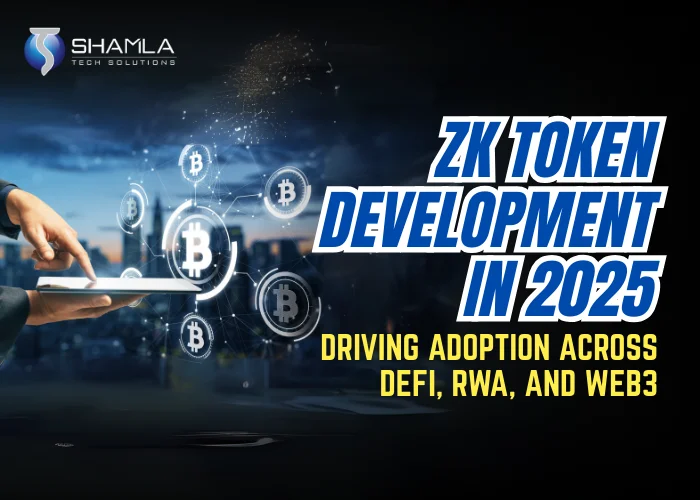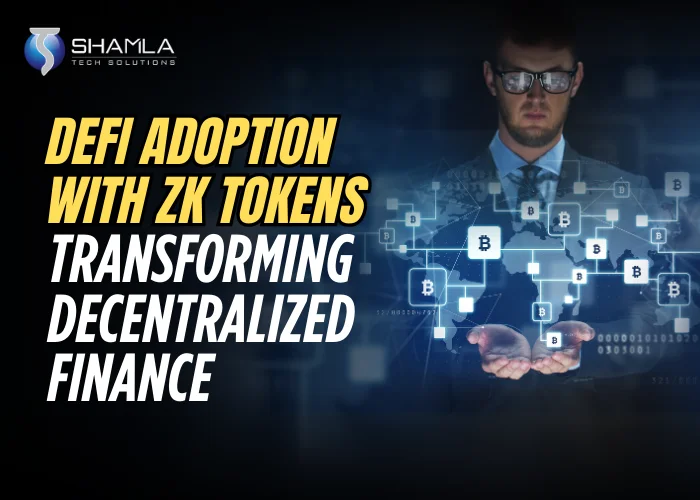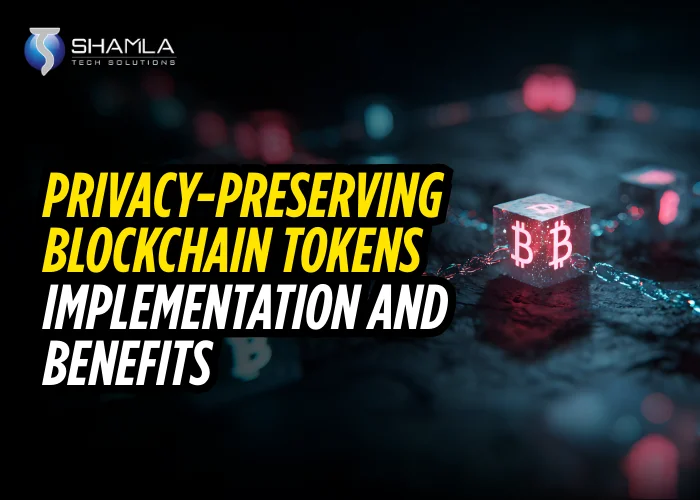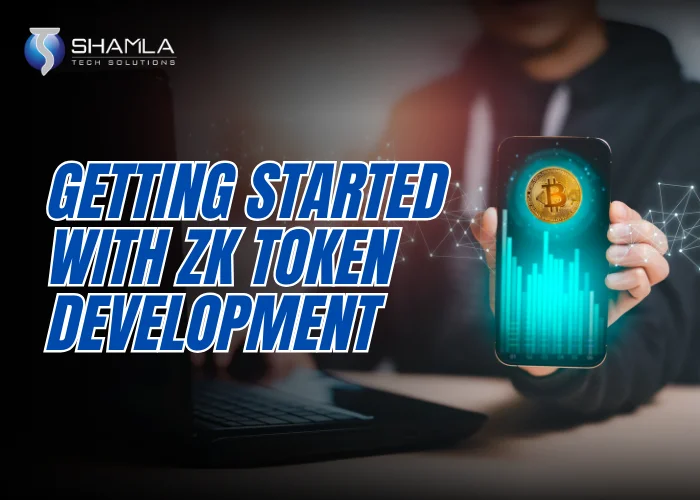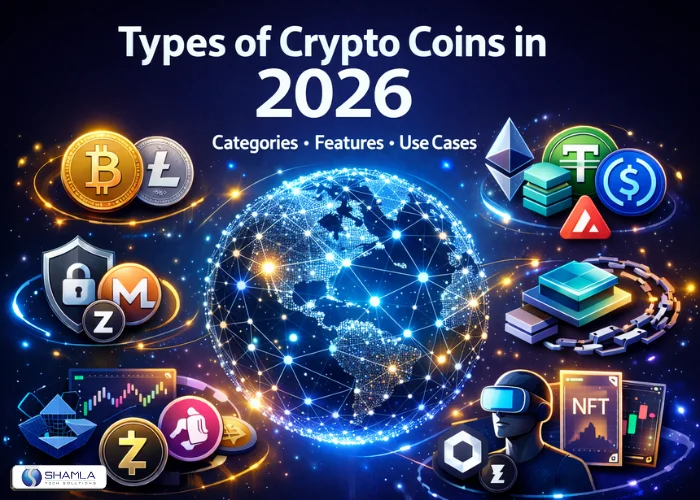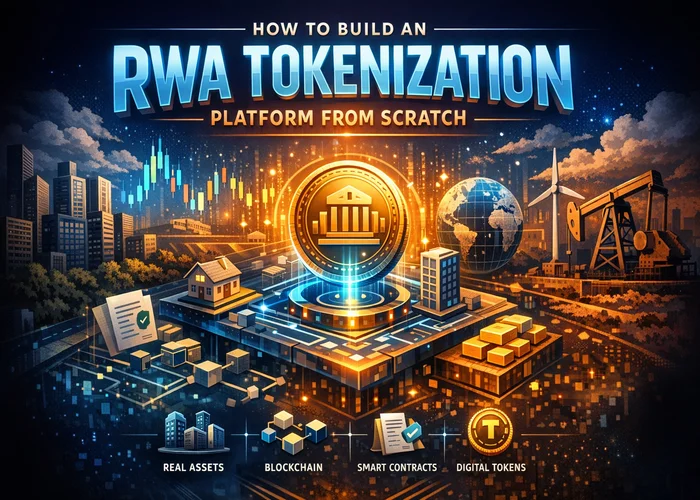In 2025, groundbreaking ZK token development combines privacy, scalability, and security in blockchain technology. As bitcoin grows, Zero-Knowledge (ZK) technology has become the foundation of next-generation blockchain applications, addressing key obstacles that have hampered mainstream adoption. From improving DeFi adoption with ZK coins to redefining RWA tokenization, ZK technology is changing digital privacy, financial inclusion, and decentralized systems.
Zero-knowledge proof technology revolutionizes blockchain networks by verifying sensitive data without disclosure. This breakthrough is significant for Web3 security solutions, allowing users to confirm ownership, identity, or transaction validity without revealing data. ZK technology is critical for token development projects in 2025 to generate confidence, maintain compliance, and deliver scalable solutions.
Understanding ZK Token Development in the Modern Era
ZK token development builds digital assets with Zero-Knowledge proof technology for privacy, security, and scalability. Zero-Knowledge tokens use advanced cryptography to keep transactions and interactions private while maintaining the integrity and verifiability that make blockchain technology revolutionary.
Awareness of digital privacy rights and the requirement for secret commercial transactions have encouraged the emergence of privacy-preserving blockchain tokens. Companies across sectors know that blockchain openness has many benefits, but some use cases require anonymity to protect sensitive data, trade secrets, and personal data.
Next-gen crypto token development company using ZK token development technology tackles several major blockchain system flaws. Transaction privacy, scalability difficulties, regulatory compliance, and selective disclosure in business applications are examples. Zero-Knowledge proofs allow developers to construct tokens that meet transparency and privacy criteria.
The Technical Foundation of Zero-Knowledge Proof Blockchain Development
Zero-knowledge proof and advanced mathematical frameworks allow one side to show knowledge of specific information without revealing it in blockchain development. Proofs are reliable and private thanks to this cryptographic innovation’s completeness, soundness, and zero-knowledge.
Token development using ZK technology requires various components. For efficient blockchain applications, zk-SNARKs (Zero-Knowledge Succinct Non-Interactive Arguments of Knowledge) provide concise proofs that can be verified fast. Zero-Knowledge Scalable Transparent Arguments of Knowledge (zk-STARKs) provide post-quantum security and eliminate trusted setup.
Modern token development relies on ZK rollups and scalability. Layer 2 scaling solutions combine numerous transactions into a single proof, decreasing gas costs while retaining blockchain security. ZK rollups allow crypto token developers to build Build Your Own Cryptocurrency Token with scalable systems that can serve millions of users without compromising security or decentralization.
Typical ZK token technical architecture includes an application layer with business logic, a proof generation layer that generates ZK proofs for transactions, a verification layer that validates proofs on-chain, and a settlement layer that finalizes state changes. This multi-layered method makes ZK coins privacy- and scalability-friendly while being compatible with blockchain infrastructure.
DeFi Adoption with ZK Tokens: Transforming Decentralized Finance
DeFi adoption with ZK tokens is a major step toward ZK token acceptance. While revolutionary in democratising financial services, traditional DeFi protocols generally lack privacy protections for institutional adoption and sensitive financial activities. ZK tokens enable secret transactions, confidential trading, and selective financial information dissemination.
Privacy-preserving Decentralized finance protocols enabled by ZK technology let users engage without disclosing their trading methods, portfolio compositions, or transaction histories. Institutional investors need privacy in their trading while yet enjoying DeFi’s openness and decentralisation.
ZK tokens enable advanced DeFi applications impossible before. Private automated market makers (AMMs) shield traders from front-running and MEV attacks by providing liquidity without order book information. Institutional DeFi involvement has been limited by privacy concerns, although confidential lending protocols allow borrowers to obtain cash without identifying their financial standing.
ZK rollups and scalability solutions have rapidly reduced transaction costs and increased throughput, accelerating DeFi adoption. Complex DeFi strategies involving many transactions are now possible without gas fees, making DeFi accessible to more people and enabling new financial products.
Real World Asset Tokenization Through ZK Technology
One of the most potential uses of ZK token technology is real world asset (RWA) tokenization, combining traditional banking and blockchain innovation. ZK technology enables advanced privacy and compliance for tokenizing tangible assets like real estate, commodities, art, and intellectual property.
Traditional asset tokenization has privacy, compliance, and regulatory issues. Asset owners typically want anonymity about their holdings, valuations, and transactions. ZK coins let asset owners establish ownership and comply with regulations without disclosing sensitive company information.
RWA tokenization with ZK technology allows various innovations. Ownership records can be protected in confidential asset registries. On-chain private auctions and sales can hide bidding methods and prices. Zero-knowledge proofs automate compliance reporting while protecting confidentiality.
Companies that tokenize RWAs are using ZK technology to build systems that manage the complete asset lifetime. These platforms support asset generation, tokenization, trading, and settlement while meeting institutional privacy and regulatory needs.
Web3 Security Solutions Powered by ZK Technology
Zero-Knowledge proof technology has improved Web3 security. Web3 apps manage sensitive data and valuable digital assets, making strong security and user privacy essential.
ZK technology allows Web3 applications to include new security features. Users can verify their age, location, and credentials without giving personal information. This technique addresses privacy concerns and meets regulatory criteria.
ZK-powered private smart contracts enable confidential computing on public blockchains. Business logic can execute with private inputs, outputs, and intermediate states. Enterprise applications that need secrecy and blockchain security, and transparency need this functionality.
ZK-based authentication allows secure access management without centralized identity suppliers. Users can establish their permission to access resources or services without revealing their identity or leaving digital footprints.
Next-Generation Crypto Token Development Strategies
ZK proofs underpin 2025, create your own cryptocurrency token, which integrates various advanced technologies. Modern token creation must balance scalability, privacy, interoperability, and regulation.
ZK token development requires numerous specialised steps. Cryptographic principles and performance must be understood for circuit design and optimization. Effective proof generation systems must preserve security and be practical. Verification systems must be blockchain-compatible and provide anonymity.
Crypto token developers are significantly investing on ZK expertise and tooling. The ZK token development stack contains specialized programming languages, proof creation libraries, verification frameworks, and integration tools. This technological complexity requires expertise and resources, making partnerships with experienced development teams essential.
Integration of ZK technology with other emerging technologies boosts innovation. Ai-powered proof generation optimization can boost efficiency and lower expenses. Private transactions across blockchain networks are possible using cross-chain ZK bridges. Private data collection and verification for real-world applications is possible with IoT devices.
Privacy-Preserving Blockchain Tokens: Implementation and Benefits
Privacy-preserving blockchain tokens change how digital assets handle sensitive data. Use cases, legislative restrictions, and technical limits must be considered while designing token privacy features.
Privacy-preserving tokens offer more than transaction security. Selective disclosure lets users share certain information with authorized parties while keeping others private. Business applications where stakeholders need different information require this functionality.
ZK tokens enable reporting and auditing without compromising user privacy, making regulatory compliance easier. Zero-knowledge proofs can automate compliance checking without disclosing transaction data.
ZK technology has increased privacy-preserving token user experience. Reduced proof generating times enable real-time applications. Non-technical users can use privacy features because user interfaces abstract cryptographic activities.
Building ZK Tokens: A Comprehensive Development Guide
Create Your First Cryptocurrency Token with ZK capabilities demands careful preparation and specific knowledge. Define privacy, compliance, and technological specifications to guide implementation.
The first step is selecting a ZK proof system based on needs. Though efficient and compact, zk-SNARKs require trusted setup ceremonies. zk-STARKs offer post-quantum security and transparency with greater proof sizes. Recent improvements like Plonk and Halo2 improve flexibility and performance.
ZK-enabled cryptocurrency token development requires specialized tools and frameworks. Circuit development is available from Circom and arkworks, while ZoKrates and Noir offer ZK application programming languages. Gas costs, verification times, and user experience must be considered while integrating blockchain infrastructure.
Understanding the trade-offs between implementation options is essential for developers building cryptocurrency tokens with ZK capabilities. On-chain verification is secure and decentralized yet expensive. Off-chain verification with periodic settlement reduces costs but involves trust assumptions.
Industry Applications and Use Cases
ZK token development has several sectors and use cases. ZK tokens allow secure medical data transfer without compromising patient privacy. Patients can confirm they meet insurance or work health requirements without divulging their medical history.
ZK token implementation improves supply chain management. Without divulging trade secrets or sensitive company information, companies can confirm product legitimacy, environmental compliance, and ethical sourcing. This capacity is useful in industries that value supply chain openness but must keep competitive information private.
ZK tokens are used in financial services. Private credit scoring lets people verify creditworthiness without disclosing financial details. Institutional investors can make massive trades on confidential trading platforms without market influence.
Private voting, confidential benefit distribution, and secure identity verification are government and public sector ZK token applications. Governments can give transparent services to citizens without compromising privacy.
Technical Challenges and Solutions
Zero-knowledge proof blockchain development faces technical obstacles that drive innovation. Proof generation times have improved, but real-time applications require optimization. Parallelization and specialized hardware research addresses these performance needs.
ZK token implementations consider scalability. ZK rollups outperform Layer 1 solutions, but global-scale applications require ongoing tuning. Scalability issues are being addressed by proof aggregation and recursive proof innovations.
Interoperability between ZK proof systems and blockchain networks requires standardization. While ensuring security, cross-chain ZK bridges must handle multiple proof formats and verification procedures.
Complex proof generation and wallet integration are UX issues. ZK coins are becoming more mainstream because to client-side proving and mobile optimization.
The Role of Crypto Token Development Companies
ZK token acceptance is boosted by crypto token development companies’ knowledge and resources. These enterprises need ZK-specific expertise, tooling, and infrastructure to succeed.
It takes cryptographers, blockchain engineers, smart contract auditors, and user experience designers to build ZK tokens. Successful ZK crypto coin developers have strong research capabilities and academic partnerships.
Leading ZK development businesses offer circuit design, optimization, smart contract development, security auditing, and maintenance. Many organizations offer consulting services to help clients grasp ZK technology’s consequences and prospects for their use cases.
Future Outlook and Market Trends
Innovation and adoption will drive ZK token development beyond 2025. Hardware acceleration for proof creation improves ZK efficiency and accessibility. Cryptography-specific ZK processing units (ZPUs) are being created like GPUs for graphics processing.
ZK system protocols and interfaces are being standardized across the industry. Standardization will simplify development and improve interoperability.
Governments are realizing ZK technology’s compliance and audit benefits, clarifying privacy-preserving technology regulations. This regulatory support accelerates ZK token enterprise usage.
ZK technology combined with AI and quantum computing creates new potential and difficulties. Post-quantum ZK proof systems are being developed for future security.
Getting Started with ZK Token Development
Before producing a cryptocurrency token with ZK capabilities, organizations should analyze their privacy and scalability needs. Successful implementation requires understanding use cases and regulations.
Finding the proper development partner is crucial for ZK token ventures. Companies should seek crypto token developers with ZK competence, robust security standards, and industry or use case experience.
A proof of concept verifies technical feasibility and performance before development. Then come comprehensive design, implementation, testing, and security auditing. Long-term success requires maintenance and adjustment.
Conclusion
ZK token development in 2025 is redefining blockchain with privacy, scalability, and innovation. Zero-Knowledge technology is allowing new applications and business models by increasing DeFi usage with ZK tokens and modernizing RWA tokenization.
Privacy-preserving blockchain tokens on Web3 infrastructure are enabling broad adoption while addressing privacy and compliance concerns. ZK token adoption costs and complexity reduce as rollups and scaling solutions mature.
ZK technology helps companies generate next-gen crypto tokens that meet transparency and privacy criteria. Specialised crypto token development businesses are essential for negotiating ZK token technological complexity and maximising their potential.
Get Your ZK Token Developed with Experts Solution and Ongoing Help. Connect With Us Today.

